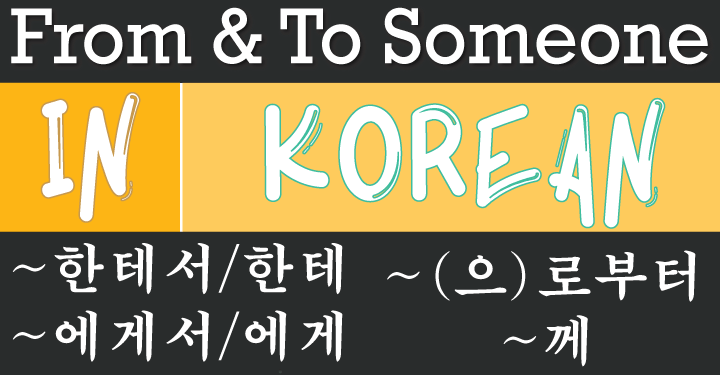~한테서/한테, ~에게서/에게
~께, & ~(으)로부터 in Korean
This lesson will teach you the Korean particles ~한테서/한테, ~에게서/에게, ~께, and ~(으)로부터. You may use these Korean particles to make sentences that include the words “To” and “From” someone in Korean.
Ex. “I gave juice to my mother.” or “I received a gift from my father.”
가자!
~한테, ~에게, & ~께 “To” in Korean
~한테, ~에게, & ~께 all mean “To” in Korean. You may attach ~한테, ~에게, or ~께 to a noun to express which person or animal is receiving an action.
When you use ~한테, ~에게, & ~께 as “To” in Korean, you must attach them to a living noun.
Ex. Thomas한테, Student,에게 or Teacher께
When To Use ~한테, ~에게, & ~께
- ~한테 is used most often in Korean conversations.
- ~에게 is used in more formal situations and written material.
- ~께 is used with people that deserve high respect like: parents, seniors, teachers, or bosses.
Sample Sentences in Korean
| Korean | English |
| 저는 토마스한테 전화 할 거예요. | I will call to Thomas. |
| 저는 어머니에게 주스를 줬어요. | I gave juice to mother. |
| 저는 선생님께 숙제를 드렸어요. | I gave homework to the teacher. |
Learn Korean Language Tips
There are multiple versions of some words in Korean. 주다 and 드리다 are both “Give” in Korean. 드리다 is used with people that deserve high respect according to Korean honorifics. Since a teacher, 선생님, deserves high respect the verb 드리다 was used.
선생님께 숙제를 드렸어요.
Since ~께 is honorific, you should use other honorific language with it.
Korean Verbs and Honorific Equivalents
| Korean Word | Honorific Korean Word | English |
| 주다 | 드리다 | Give |
| 말하다 | 말씀하다 | Speak, Say |
| 계시다 | 있다 | To exist at (a location) |
| 자다 | 주무시다 | Sleep |
~한테 can mean “To” or “From”in Korean
~한테 is “To” in Korean according to the dictionary but in Korean conversation ~한테 can mean either “To” or “From.” You have to pay attention to context while speaking to determine if the meaning of “To” or “From” is being used. This is very easy, even for beginners, to do.
~한테서 & ~에게서 “From” in Korean
~한테서 and ~에게서 are “From” in Korean. You may attach ~한테서 and ~에게서 to a noun to express which person or animal an action is coming “From.”
When you use ~한테서 or ~에게서 as “From” in Korean, you must attach them to a living noun.
Ex. Thomas한테서, Teacher에게서
When To Use ~한테서 & ~에게서
- ~한테서 is used most often in Korean conversations.
- ~에게서 is used in more formal situations and written material.
Sample Sentences in Korean
| Korean | English |
| 저는 토마스한테서 전화 받을 거예요. | I will receive a call from Thomas. |
| 저는 여자친구한테서 전화 기다려요. | I wait for a phone call from my girlfriend. |
| 저는 선생님에게서 영어를 배웠어요. | I learned English from my teacher. |
| 저는 어머니에게서 선물로 컴퓨터를 받았어요. | I received a computer from my mother as a gift. |
~(으)로부터 “From” in Korean
~(으)로부터 is “From” in Korean. You may attach ~(으)로부터 to a noun, living or nonliving.
Remember that ~한테서/한테, ~에게서/에게, and ~께 can only be attached to living nouns like people or animals.
You may attach ~으로부터 to nouns that end in a consonant.
You may attach ~로부터 to nouns that end in a vowel.
Sample Sentences in Korean
| Korean | English |
| 저는 토마스로부터 전화 받을 거예요. | I will receive a call from Thomas. |
| 저는 여자친구로부터 전화 기다려요. | I wait for a phone call from my girlfriend. |
| 저는 선생님으로부터 영어를 배웠어요. | I learned English from my teacher. |
| 저는 어머니로부터 선물로 컴퓨터를 받았어요. | I received a computer from my mother as a gift. |


Leave a Reply
You must be logged in to post a comment.